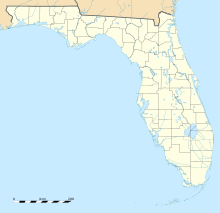Florida Museum of Natural History
 |
|
| Established | 1891 |
|---|---|
| Location | 3215 Hull Rd., Gainesville, Florida |
| Coordinates | 29°38′09″N 82°22′13″W / 29.63583°N 82.37028°W |
| Type | Natural history |
| Visitors | 200,000 est. 2007 |
| Director | Dr. Douglas S. Jones. |
| Public transit access | Family Housing Stop Route 20 & 21, RTS |
| Website | Official website |
The Florida Museum of Natural History (FLMNH) is the State of Florida's official state-sponsored and chartered natural history museum. Its main facilities are located at 3215 Hull Road on the campus of the University of Florida in Gainesville, Florida.
The main public exhibit facility, Powell Hall and the attached McGuire Center, are located in the Cultural Plaza, which it shares with the Samuel P. Harn Museum of Art and the Curtis M. Phillips Center for the Performing Arts. The main research facility and former public exhibits building, Dickinson Hall, is located on the east side of campus at the corner of Museum Road and Newell Drive. On April 18, 2012, the AIA's Florida Chapter placed Dickinson Hall on its list of Florida Architecture: 100 Years. 100 Places as the Florida Museum of Natural History / Formerly Florida Museum of Natural Sciences.
Powell Hall's permanent public exhibits focus on the flora, fauna, fossils and historic peoples of the state of Florida. The museum does not charge for admission to most exhibits; the exceptions are the Butterfly Rainforest and certain traveling exhibits.
The museum's collections were first used for teaching at Florida Agriculture College in Lake City in the 1800s, and were relocated to the campus of the University of Florida in 1906. The museum was chartered as the state's official Natural History Museum by the Florida Legislature in 1917. Formerly known as the Florida State Museum, the name was changed in 1988 to more accurately reflect the museum's mission and help avoid confusion with Florida State University, which is located in Tallahassee.
The role of the Florida Museum of Natural History as the official natural history museum for the State of Florida is defined by Florida Statute §1004.56 which states:
"The functions of the Florida Museum of Natural History, located at the University of Florida, are to make scientific investigations toward the sustained development of natural resources and a greater appreciation of human cultural heritage, including, but not limited to, biological surveys, ecological studies, environmental impact assessments, in-depth archaeological research, and ethnological analyzes, and to collect and maintain a depository of biological, archaeological, and ethnographic specimens and materials in sufficient numbers and quantities to provide within the state and region a base for research on the variety, evolution, and conservation of wild species; the composition, distribution, importance, and functioning of natural ecosystems; and the distribution of prehistoric and historic archaeological sites and an understanding of the aboriginal and early European cultures that occupied them.
...
Wikipedia

